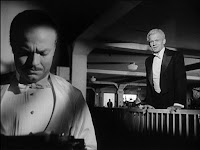In my senior year of high school, I took a film literature class. We learned about all things from the origination of black and white film, to Alfred Hitchcock, to modern day techniques. However, my teacher never stopped telling us about how Citizen Kane was one of the greatest movies of all time.
 |
| Poster for Film |
Citizen Kane is also a huge achievement, because Welles was only 25 at the time it came out. It was his debut film and he managed to be written in history for it.
Personally, I can appreciate what the film did in terms of film history. Before this movie, nobody took risks in filmmaking. There was a way people did things and that was that.
 |
| Expressionistic Lighting |
Another cool thing that is utilized in Citizen Kane is low angles. This was not used before this film, because it meant that the sets had to have ceilings.
All of the ceilings in the film were constructed out of cloths so that the crew could place microphones above the actors heads.
Welles had already made a name for himself in radio before taking on this project, so it makes sense that his film would utilize fantastic audio techniques.
Welles used overlapping dialogue for the first time. This meant that the characters talked over each other which was very unlike films prior to this, but led to a more realistic narrative.
Plot wise, the film structure is also unique. It is presented in a non-linear structure which means that the events do not take place in chronological order.
The order of events make the movie more interesting to watch, as it is presented like a detective style film.
I have talked so much about why the film is so innovated, but I have not yet touched on the plot of it. The whole film is about trying to decipher the meaning behind Charles Kane's last word (Rosebud).
 |
| Filming a Low-Angle Shot |
Regardless of how innovated this film was, the public perception was not always good. William Randolph Hearst was so furious at the depiction of him in the film, that he banned any of his newspapers from running ads on the it.
Hearst was most angered by the depiction of his second wife in the film, Marion Davies. He did not like that she was shown as a showgirl and called it a "dirty trick."
Hearst was so angry about the film, that he threatened to go to war against the Hollywood studio system in general.
There was so much drama surrounding the original release of the film, that it barely broke even. It was nominated for nine Oscars, but only won one for best screenplay.
I personally have loved Citizen Kane since high school, because it represents a time that was so influential in film. I love the fact that a movie that is often considered the best film ever is centered around the life of a journalist.
No matter whether you agree that Citizen Kane is the greatest movie ever, it is universally agreed upon that it was one of the most influential films of all time.


No comments:
Post a Comment